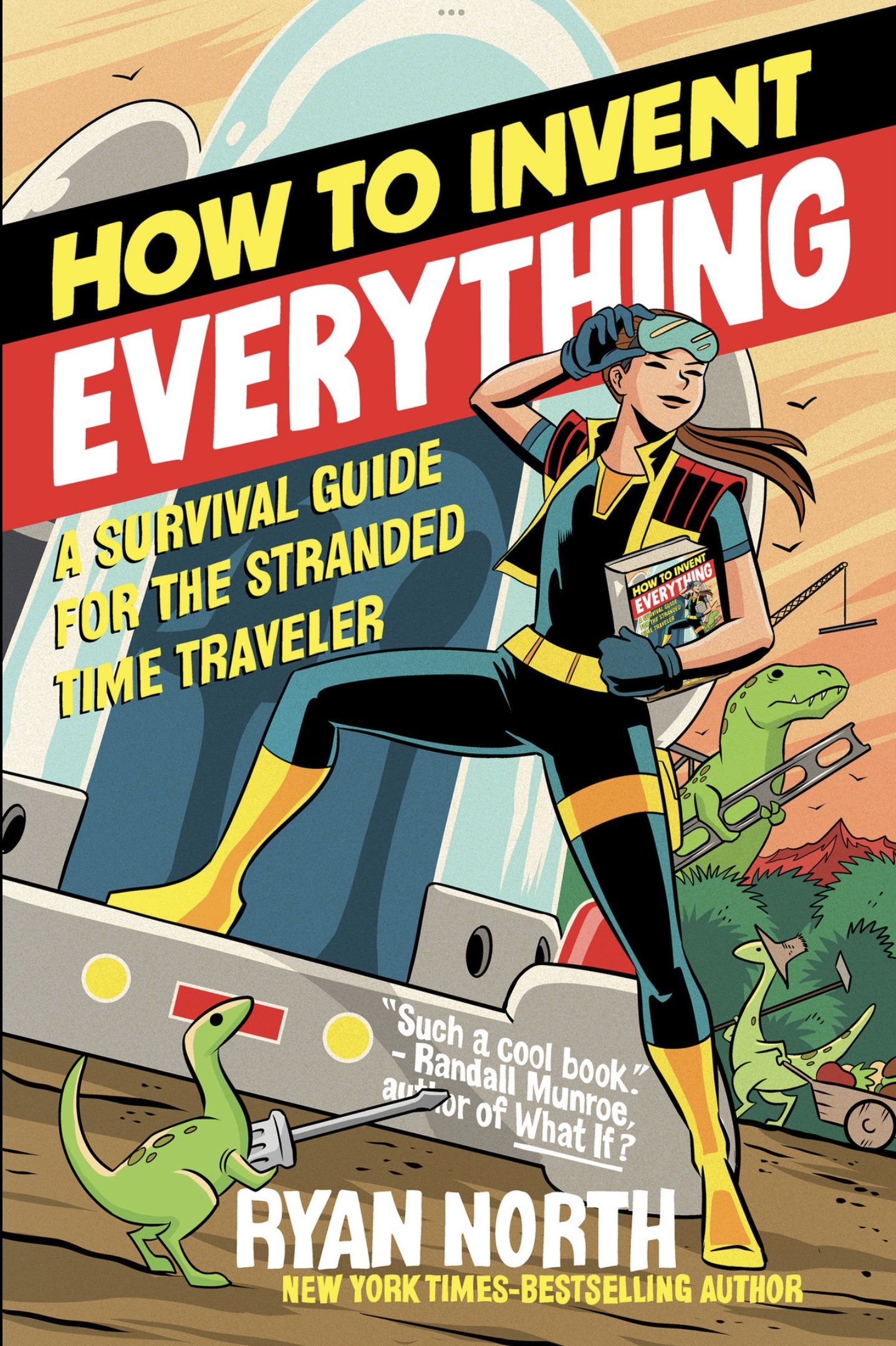Adventures In Survival
As an Amazon associate, I may earn a small commission if you navigate to Amazon from my site and buy something. This will not result in an extra cost to you.
Have you ever been reading a good historical novel, and you’re busily inserting yourself into the narrative, so as to really immerse yourself in the world, and then you think to yourself, “This time period would be perfect if I knew how to make penicillin so that I don’t die of some deadly infection”….? No? Just me, then? Hmmmm….I guess I’ll have to be mistress of Pemberly all by myself.
But I have often wondered (apparently alone) how certain modern conveniences might be managed in an historical setting, were I ever to find myself in one, real or imagined. And I found the perfect manual. It’s a book called How To Invent Everything: A Survival Guide For The Stranded Time Traveler by Ryan North.
The premise is that time travel has now become a tourist attraction, where you can rent a cheap (and clearly not foolproof) time machine (Chronotrix Solutions presents the FC3000) in which to pop off to the Cretaceous for some sun and sand and dinosaurs. And the entire book is a manual on how to reinvent civilization, should you find yourself stranded in the past…or the extremely distant past.
“Now we need bacteria to show us penicillin has colonized our Petri dishes by not growing around it. Let’s use Staphylococcus, a harmless bacteria that resides inside human mucus membranes, which leads us to this civilization pro tip: Sometimes all you need to do to become one of the great scientists in history is to pick your nose and wipe it on a Petri dish”
With many little futuristic footnotes and asides, the book basically takes us through humanity’s progress from inventing fire and the wheel all the way through the computer age. It starts with a handy (and extensive) flowchart on how to determine what time period you’ve been stranded in, and then takes you through civilization (re-)building step-by-step, from the five fundamental technologies needed for any civilization (spoken language, written language, non-sucky numbers, the scientific method, and calorie surplus) on through to the computer age.
It’s intended for the reader to be able to pick any starting point and read what interests them (penicillin, definitely!), although I confess I took a more disciplined approach and read the book start to finish.
“This fight included…the proposal of an ‘electric duel,’ in which representatives from each company would be shocked by equal but increasing amounts of electrical power from their own systems, with the first to quit being the loser. The duel never happened in our timeline, but other time travelers have proven that in this period of high tensions, it takes only a well-timed shout of ‘Hey, that guy just said that the other guy was too much of a wimp to get electrocuted for business reasons!’ to set this particular event into motion.”
Although the title is suggestive of science fiction, this is in fact just a really entertaining (and superficial) history of civilizations and technology. The time travel mentioned in the title is almost completely incidental. And I did learn how to make penicillin. Toward the end of the book, there is a chapter entitled Major Schools Of Philosophy (with a handy list for reference), and which perhaps gives a taste of the flavor of the book. For the purpose of not being depressing, the various schools of philosophy are framed as a question not of the search for meaning and purpose in life, but instead in terms of high-fives. No, really. A sampling:
Under religious philosophies, we have:
Monotheism: God gave me a high-five.
Pantheism: The universe, which is equivalent to a god, gave me a high-five.
Agnosticism: Maybe a god gave me a high-five but maybe I gave it to myself. Who’s to say?
Solipsism: I gave myself a high-five. Unfortunately, I only imagined it, since nothing outside my own mind really exists.
And under philosophies of being, we have:
Nihilism: Nothing, including high-fives, has any meaning.
Pragmatism: High-fives are only good if they can accomplish something.
Absurdism: The sheer size, scope, and potential of things to understand about even one single high-five makes ever discovering the true meaning of high-fives impossible, and the only rational responses are suicide or blindly hoping there’s a god who could one day completely understand high-fives, or failing either of those, accepting the absurdity of high-fives and, despite it all, still cheerily handing them out.
“Temporal experiments have been performed in which a functional wooden glider was introduced to Europe in 1000 CE, with no other supporting technologies. This still doesn’t produce powered flight until around the Industrial Revolution in 1760 CE, but it does reliably produce aircraft carriers—complete with the crossbow-style catapults to launch the gliders into the sky—by the Renaissance of the early 1400s.”
I will admit that, as much as I enjoyed this book, there were sections of it that were almost as impenetrable to me as some of the more advanced math and science that I studied at college. While this book gives excellent explanations, it doesn’t automatically make someone who struggles with math and science suddenly transform into a math/science genius. More’s the pity, but I imagine that’s too much to expect of any book. It will have to be sufficient that I enjoyed the ride and that I now have this book to refer to when I’m reading anything historical and I suddenly think, “You know, that could be done more easily with a water wheel than with a donkey.”
Math/science genius questions aside, I definitely recommend this book. Enjoy!
“If all poodles are dogs, and all dogs are mammals, then concluding that some poodles are mammals, while technically correct, is pretty misleading. This leads us to this very important civilization pro tip: All poodles are definitely mammals.”
